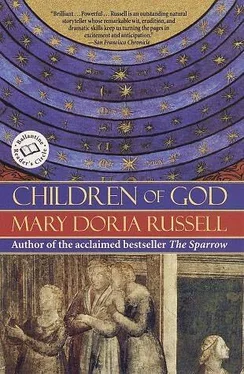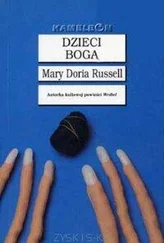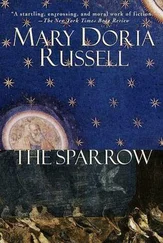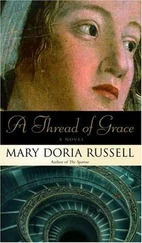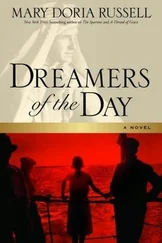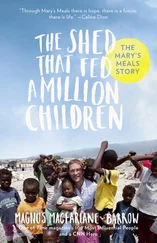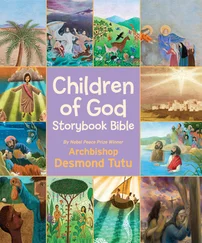"Their hands are double-thumbed and their craftsmanship is superb, but some members of the Jesuit party suspected that the Runa in general were somewhat limited intellectually. Their material culture seemed too simple to account for the powerful transmissions first detected on Earth by radio telescope in 2019. Furthermore, the Runa were disturbed and frightened by music, which seemed anomalous, given that it was radio broadcasts of chorales that first alerted us to the existence of Rakhat. However, individual Runa seemed quite bright, and the tentative conclusion was that the village of Kashan was something of a backwater on the edge of a sophisticated civilization. Since there was so much to be learned in Kashan, the decision was made to remain there for a time.
"To the great surprise of our people, the Singers of Rakhat were in fact a second sentient species. The Jana’ata bear a striking but superficial physical resemblance to the Runa. They are carnivorous, with prehensile feet and three-fingered hands that are clawed and rather bearlike. For the first two years of the mission, the Jana’ata were represented by a single individual: Supaari VaGayjur, a merchant based in the city of Gayjur who acted as a middleman for a number of isolated Runa villages in southern Inbrokar, a state that occupies the central third of the largest continent of Rakhat.
"The Jesuit party had every reason to believe Supaari was a man of goodwill. If anything, their relationship with the Runa villagers was improved by Supaari’s intervention and aid, and Sandoz attributes much of his own understanding of Rakhat’s civilization to Supaari’s patient explanations. Supaari’s gross betrayal of Sandoz’s trust remains one of the great puzzles of the mission.
"2. Humans make tools; the Jana’ata breed theirs.
"The Runa are the hands of the Jana’ata: the skilled trades, the domestic staffs and laborers, even the civil service. But the differences in status between the Jana’ata and Runa are not merely those of class, as our people believed. The Runa are essentially domesticated animals—the Jana’ata breed them, as we breed dogs.
"The Runa do not reproduce unless their diet reaches a critical level of richness that brings on a sort of estrus. This biological fact has become the basis of the Rakhati economy. The Runa ’earn’ the right to have children by cooperating economically with the Jana’ata. When a village corporate account has reached a target figure, the Jana’ata make a sufficiency of extra calories available to the villagers to allow for a controlled production of young, without risk of environmental degradation by overpopulation.
"The core values of Jana’ata society are stewardship and stability, and in keeping with this, the Jana’ata also limit their own reproduction, maintaining their numbers at approximately 4 percent of the overall Runa population. Strict lines of inheritance rule a largely ceremonial life, and only the first two children of any breeding Jana’ata couple may themselves marry and reproduce. If later-born adults decline to be neutered, they are permitted to have sex with Runa concubines, since cross-species sex carries no risk of unsanctioned reproduction. Jana’ata thirds are most commonly involved in commerce, scholarship and, evidently, prostitution. In this context, it should be noted that Supaari VaGayjur was a third.
"Moreover, and most shockingly, the Jana’ata have bred the Runa not just for intelligence and trainability, but also for meat. We have paid in lives for this knowledge, Your Holiness."
It was there that Giuliani had stopped the night before, listening for a time to the sound of Sandoz’s footsteps above him. Five steps, pause; five steps, pause. At least when Emilio was pacing, one could be certain that he had not yet added his own life to the toll taken by the mission to Rakhat…. Sighing, Giuliani now returned to his task.
"3. The Jana’ata do not keep the Runa in stockyards.
"When Runa adults have raised their own children to the age of reproduction, the parents voluntarily give themselves up to Jana’ata patrols, who periodically round up such older adults and any substandard infants, all of whom are then butchered.
"Your Holiness must understand that our people were completely unaware of the facts underlying the relationship of the Jana’ata and the Runa when they witnessed the arrival of a culling patrol that began killing VaKashani infants. The situation was complex, and I urge you to read the transcripts of Sandoz’s testimony, but the Stella Maris party perceived this incident as an unprovoked attack on the VaKashani Runa. Led by Sofia Mendes, our people resisted, several of them dying in defense of innocent children. It was this act of selfless bravery that Supaari VaGayjur characterized as incitement to rebellion among the Runa, and that the Contact Consortium later publicized as reckless and culpable interference in Rakhati affairs. It must be admitted, however, that many Runa—inspired by the courage of Sofia Mendes to protect their own children—died as a result of their defiance."
The Father General sat back in his chair. And now, he thought, the worst of it.
"After the massacre at Kashan," Giuliani began again, "there were only two survivors from the Stella Maris party. Emilio Sandoz and Father Marc Robichaux were taken prisoner by the Jana’ata patrol and force-marched for weeks, during which time they both witnessed the deaths of many Runa. They were offered food each morning, and Sandoz did not realize for some time that he was eating the meat of Runa infants; when understanding dawned, he was starving, and continued to eat the meat. This is a source of continuing shame and distress to him.
"When Supaari VaGayjur learned of their arrest, he tracked the two priests down and evidently bribed the patrol’s commander, thus obtaining custody of them. Once in Supaari’s compound, Sandoz was asked if he and Robichaux were willing to ’accept hasta’akala.’ Sandoz believed they were being offered hospitality and agreed. To his horror, his hands and those of Father Robichaux were promptly destroyed; Robichaux bled to death as a result. Approximately eight months later, Supaari VaGayjur sold Sandoz to a Jana’ata aristocrat named Hlavin Kitheri. I hope that Your Holiness cannot imagine the brutality of the treatment to which Sandoz was subject while in Kitheri’s possession."
Shuddering, the Father General stood abruptly and turned away from what he had written. "What is a whore, but someone whose body is ruined for the pleasure of others?" Emilio had asked him once. "I am God’s whore, and ruined." For a time, Giuliani moved sightlessly through his office— five steps, turn; five steps, turn—until he became aware that he had unknowingly matched the pacing he heard so many nights in the bedroom above his. Finish it, he told himself, and sat once more to write.
"Months later, when the Magellan arrived in orbit around Rakhat, members of the Contact Consortium boarded the derelict Stella Maris and accessed records of the first two years of our mission. The entire Jesuit party was missing and presumed dead. The Magellan party made landfall near the village of Kashan, and were greeted with hostility and fear, in stark contrast to the welcome the Stella Maris party had received. A young Runa female named Askama told them in English that Emilio Sandoz was still alive and residing with Supaari VaGayjur in the city of Gayjur. Hoping for guidance from Sandoz, the Magellan party was taken to that city by Askama, who was clearly devoted to Sandoz.
"When they arrived in Gayjur, Supaari admitted to the Magellan party that Sandoz had been a member of his household until recently. Sandoz was now living elsewhere at his own request, Supaari told them. Supaari also gave them to believe that many lives had been lost because of the foreigners’ interference in local matters. Despite this, Supaari was helpful to the Magellan party and quite happy to do business with them, although he remained evasive on the subject of Sandoz’s whereabouts.
Читать дальше
